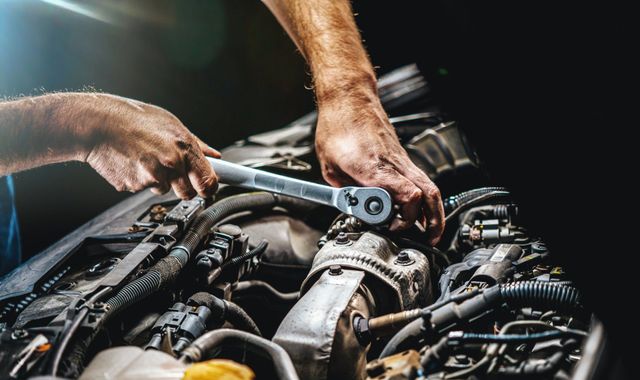All Categories
Featured
The timing belt is an essential component of your engine, responsible for integrating the activity of various engine components, such as the crankshaft and camshaft. While the timing belt may not be something you believe around often, overlooking its upkeep can lead to considerable engine damage and expensive repairs.
What Is a Timing Belt and How Does It Function? The timing belt is a rubber or composite product belt that attaches the crankshaft to the camshaft in an internal burning engine. The camshaft controls the opening and closing of the engine's intake and exhaust shutoffs, and it should be timed perfectly with the motion of the pistons in the engine. The timing belt guarantees that these parts are in sync, permitting the engine to run efficiently.
If the timing belt fails or becomes worn, the camshaft and crankshaft will certainly no longer be synchronized, which can trigger the engine's valves to strike the pistons. This brings about devastating engine damages and typically needs pricey fixings or even an engine substitute.
Why Is Timing Belt Replacement Important? In time, the timing belt can put on down as a result of rubbing, heat, and general engine wear. While it might appear like a small problem, a malfunctioning timing belt can cause major engine issues. Right here's why timely substitute is vital:
Stopping Engine Damages: As mentioned, a broken or sliding timing belt can cause the engine's valves and pistons to clash. This causes curved valves, harmed pistons, and in extreme cases, a total engine failing. Replacing the timing belt prior to it breaks can avoid this pricey damages.
Maintaining Engine Performance: A damaged timing belt can interrupt the synchronization of the engine elements, decreasing total engine performance. Replacing the belt assists preserve optimal engine feature, guaranteeing smooth procedure, boosted gas efficiency, and better efficiency.
Preventing Unanticipated Break down: A damaged timing belt can leave you stranded on the side of the road, creating a significant inconvenience. By changing the timing belt at the recommended periods, you can prevent the threat of an unexpected break down, especially in the middle of a lengthy journey or when you least expect it.
![]()
Saving Cash in the Lengthy Run: While timing belt replacement can seem like an expenditure you may want to avoid, it's more affordable than the price of repairing or replacing a harmed engine. If the timing belt breaks, the substitute expense is fairly economical compared to the considerable repair work called for. Aggressive maintenance can save you hundreds of bucks out of commission and maintain your automobile's worth.
When Should You Replace the Timing Belt? The timing belt replacement routine can vary depending on your lorry's make and model. As a whole, the majority of manufacturers suggest changing the timing belt every 60,000 to 100,000 miles. Nonetheless, it's always best to consult your proprietor's manual or a relied on technician for specific suggestions for your vehicle.
Indications that your timing belt might be in requirement of replacement consist of unusual engine sounds such as whimpering or ticking, difficulty beginning the engine, or a visible decrease in engine performance. It's essential to have the timing belt evaluated quickly. if you experience any of these symptoms.
![]()
Final thought. Changing the timing belt at the recommended periods is a vital component of keeping your engine's health and wellness and ensuring that your lorry runs efficiently. A busted timing belt can result in costly repair work, engine failure, and unexpected break downs, which can be prevented with correct upkeep. If you observe any signs of wear or damage, constantly follow the maker's advised timing belt substitute schedule and seek advice from a specialist technician. By keeping this essential component of your engine in good problem, you'll secure your automobile from expensive repair work and enjoy several even more miles of worry-free driving.
What Is a Timing Belt and How Does It Function? The timing belt is a rubber or composite product belt that attaches the crankshaft to the camshaft in an internal burning engine. The camshaft controls the opening and closing of the engine's intake and exhaust shutoffs, and it should be timed perfectly with the motion of the pistons in the engine. The timing belt guarantees that these parts are in sync, permitting the engine to run efficiently.
If the timing belt fails or becomes worn, the camshaft and crankshaft will certainly no longer be synchronized, which can trigger the engine's valves to strike the pistons. This brings about devastating engine damages and typically needs pricey fixings or even an engine substitute.
Why Is Timing Belt Replacement Important? In time, the timing belt can put on down as a result of rubbing, heat, and general engine wear. While it might appear like a small problem, a malfunctioning timing belt can cause major engine issues. Right here's why timely substitute is vital:
Stopping Engine Damages: As mentioned, a broken or sliding timing belt can cause the engine's valves and pistons to clash. This causes curved valves, harmed pistons, and in extreme cases, a total engine failing. Replacing the timing belt prior to it breaks can avoid this pricey damages.
Maintaining Engine Performance: A damaged timing belt can interrupt the synchronization of the engine elements, decreasing total engine performance. Replacing the belt assists preserve optimal engine feature, guaranteeing smooth procedure, boosted gas efficiency, and better efficiency.
Preventing Unanticipated Break down: A damaged timing belt can leave you stranded on the side of the road, creating a significant inconvenience. By changing the timing belt at the recommended periods, you can prevent the threat of an unexpected break down, especially in the middle of a lengthy journey or when you least expect it.

Saving Cash in the Lengthy Run: While timing belt replacement can seem like an expenditure you may want to avoid, it's more affordable than the price of repairing or replacing a harmed engine. If the timing belt breaks, the substitute expense is fairly economical compared to the considerable repair work called for. Aggressive maintenance can save you hundreds of bucks out of commission and maintain your automobile's worth.
When Should You Replace the Timing Belt? The timing belt replacement routine can vary depending on your lorry's make and model. As a whole, the majority of manufacturers suggest changing the timing belt every 60,000 to 100,000 miles. Nonetheless, it's always best to consult your proprietor's manual or a relied on technician for specific suggestions for your vehicle.
Indications that your timing belt might be in requirement of replacement consist of unusual engine sounds such as whimpering or ticking, difficulty beginning the engine, or a visible decrease in engine performance. It's essential to have the timing belt evaluated quickly. if you experience any of these symptoms.

Final thought. Changing the timing belt at the recommended periods is a vital component of keeping your engine's health and wellness and ensuring that your lorry runs efficiently. A busted timing belt can result in costly repair work, engine failure, and unexpected break downs, which can be prevented with correct upkeep. If you observe any signs of wear or damage, constantly follow the maker's advised timing belt substitute schedule and seek advice from a specialist technician. By keeping this essential component of your engine in good problem, you'll secure your automobile from expensive repair work and enjoy several even more miles of worry-free driving.
Latest Posts
Signs When Your Car Needs Expert Auto Repair at Montclare Auto Repair
Published en
1 min read
Find Auto Services & More: Complete Auto Care Solutions from Montclare Auto Repair
Published en
1 min read
Recognizing When Your Car Needs Expert Car Repair at Montclare Auto Repair
Published en
1 min read
More
Latest Posts
Signs When Your Car Needs Expert Auto Repair at Montclare Auto Repair
Published May 26, 25
1 min read
Find Auto Services & More: Complete Auto Care Solutions from Montclare Auto Repair
Published May 24, 25
1 min read
Recognizing When Your Car Needs Expert Car Repair at Montclare Auto Repair
Published May 23, 25
1 min read